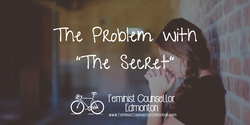I AM
Nicole Perry
Writing about mental health from a feminist counselling perspective
|
I know some people aren't going to like this post. At the same time, as a Psychologist I think it's important to tackle difficult issues and share what I know from the research and from making a career out of helping people heal and move forward in their lives. Especially for those of us who are mental health professionals or are trusted experts in our communities, we need to make sure that what we tell others about healing and growth is safe, compassionate, and ultimately does no harm. I've been seeing more and more professionals suggesting books like The Secret, and it's extremely worrisome to me.  From a feminist counselling perspective, we need to be careful with ideologies that tell us that if we simply think positive thoughts, positive things will come our way. It seems harmless at first, but when we dig deeper, we see the dangerous result of this line of thinking. First, people who don't see "success" are likely to blame themselves, feeling ashamed for not being "good enough" believers. They often end up feeling like they've failed, and that the problem lies within them. One of the major purposes of feminist therapy is to remind folks that we are not the problem. We've all grown up in this wild world, full of difficult expectations, trauma, and losses. We've grown up in this world where oppression exists, and it does us a real disservice to ignore this reality and imagine that positive thinking alone will protect us from systemic violence and inequality. We're all doing our best to navigate our way through it, and we need to be supported in that journey, not told our thoughts are wrong. The second major and hidden impact of this ideology is that we can start to blame others for the hardships they face, including losses, sexual violence, natural disasters, medical and mental health issues, and other trauma. We can start to believe that if they would just think more positively, bad things wouldn't happen to them. We can start to "other" ourselves, believing that those around us who are suffering have somehow brought this suffering onto themselves, and we're not like them. Do you see the problem here? It's not that I'm against practicing a little gratitude or working on our inner critic. At the same time, if our community is going to heal, we need to remain compassionate to ourselves and those around us. The importance of compassion is backed up by research (see Kristen Neff's work on compassion). We also need to remain aware of real structural barriers that make daily life such a struggle for the most vulnerable among us so that we can continue to work toward a just world. To put it more bluntly, no amount of thinking positive is going to keep an unarmed black man from getting shot by police in the States. No amount of positive thinking is going to keep the bombs from falling on the heads of innocent Syrian families. The world is a scary place. Books like "The Secret" provide a comfortable salve to the anxiety about the fact that we have very little control over the world and our own lives. But that temporary comfort does us and those around us a great harm. It screens us from the world's truth, and by doing so it prevents us from being able to respond to the reality that is. Other writers have gone into more depth about this book and others like it. I could continue on this topic for a long time, but I'll let others do some of the talking (and please, if you have any other good articles from a feminist perspective, I'd love for you to share them in the comments). In the meantime, please know - if positive thinking alone isn't working for you, there's good reason for it. Experience working with hundreds of clients has taught me that we need to turn toward our own and others' painful experiences with compassion and understanding. Other resources: Episode 3: The Secret by Worst Bestsellers The Staggering Bullshit of the Secret by Mark Manson
1 Comment
Penny Waller Ulmer
12/22/2017 05:36:07 pm
THANK YOU for commenting on this, Nicole.
Reply
Leave a Reply. |
AuthorNicole Perry is a Registered Psychologist and writer with a private practice in Edmonton. Her approach is collaborative and feminist at its heart. She specializes in healing trauma, building shame resilience, and setting boundaries. About the Blog
This space will provide information, stories, and answers to big questions about some of my favorite topics - boundaries, burnout, trauma, self compassion, and shame resilience - all from a feminist counselling perspective. It's also a space I'm exploring and refining new ideas.
Archives
February 2024
Categories
All
|
Online Portal for Clients
Once we are working together, please use the Owl Practice Client Portal to
|
|
